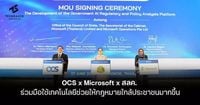Thailand is taking a giant leap forward in modernizing its legal system with the launch of an innovative AI-powered platform called TH2OECD. Spearheaded by the Office of the Council of State (OCS) in partnership with Microsoft and the Thai tech startup STelligence, this groundbreaking system is designed to analyze and compare over 70,000 Thai laws against more than 270 international standards set by the Organization for Economic Co-operation and Development (OECD) in real-time, in both Thai and English.
Mr. Pakorn Nilprapan, Secretary-General of the OCS, highlighted the urgency of this transformation, emphasizing that “good laws must protect people's rights and keep pace with a rapidly changing world.” Thailand’s legal framework, which includes a vast collection of Acts, Royal Decrees, Ministerial Regulations, and various announcements, has long faced challenges in maintaining coherence and alignment with global standards. Language barriers, in particular, have been a significant obstacle, complicating the translation and comparison of legal texts between Thai and English.
Previously, the task of reviewing and aligning Thailand’s extensive legal corpus with international norms could take years, relying heavily on manual efforts and static document formats like PDFs that were difficult to search and analyze. The TH2OECD system, however, revolutionizes this process by leveraging Microsoft’s Azure OpenAI platform and advanced natural language processing (NLP) technology to automatically translate and compare legal documents, highlighting discrepancies and enabling precise assessments of compliance.
This digital transformation is not just about technology; it’s about people. Mr. Pakorn stressed that “the digital transition is fundamentally about people and using technology to provide better services to citizens and support Thailand's progress.” By converting legal documents into structured, searchable data, the OCS has moved from a “paper-digital” approach to a “smart legal system” that enhances accessibility and efficiency for legal professionals and the public alike.
Microsoft’s Vice President for International Affairs and Law, Mr. Mike Ye, expressed pride in supporting this ambitious project, noting that “the mission to compare over 70,000 Thai laws with 276 OECD legal instruments in less than a year is a remarkable acceleration of change that many countries take years to achieve.” This rapid progress underscores Thailand’s commitment to embracing innovation and transparency as it pursues OECD membership, which promises to open doors for greater trade, investment, and international cooperation.
The collaboration with STelligence has been crucial. This Thai startup has developed AI tools that understand the complexities of legal language, which is often highly specialized and distinct from everyday speech. Their technology converts legacy PDF files into machine-readable formats and powers the AI’s ability to detect alignments and gaps between Thai laws and OECD standards automatically. Furthermore, STelligence co-designed a smart legal search engine, likened to a “Google for law,” which will empower both government officials and citizens to quickly and accurately access legal information, interpretations, and policy recommendations.
Phase one of the TH2OECD project has been completed, successfully translating and comparing thousands of Thai legal texts with OECD guidelines. Looking ahead, the OCS plans to secure additional funding to enhance the system with intelligent recommendation features and a more robust search engine. There are also plans to expand the platform’s use across other government agencies and integrate it with databases from the Cabinet Secretariat and related units.
One of the most ambitious goals is the creation of a Central Legal Data Center, a comprehensive digital repository accessible to both officials and the public, supported by AI to facilitate transparency and informed decision-making. This initiative aims to set a new standard for legal transformation in developing countries, demonstrating how technology can modernize legal systems without relying solely on English as the primary language.
Mr. Pakorn encapsulated the vision behind these efforts: “We do not believe in change just for the sake of change, but in change that empowers people—so every law is not merely written but accessible and truly protects everyone.” As Thailand moves forward with this digital overhaul, it is laying the foundation for a more transparent, efficient, and globally aligned legal system that benefits its citizens and strengthens its position on the international stage.

